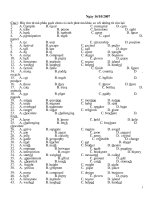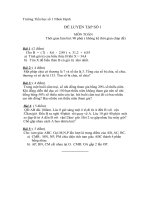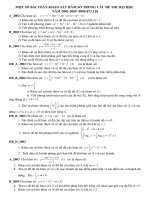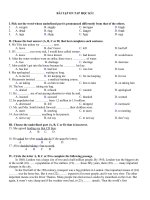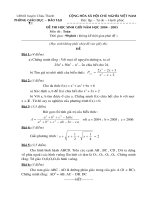bai tap hs gioi tanh 8
Bạn đang xem bản rút gọn của tài liệu. Xem và tải ngay bản đầy đủ của tài liệu tại đây (39.85 KB, 2 trang )
<span class='text_page_counter'>(1)</span><div class='page_container' data-page=1>
<b>BAØI TẬP TIẾNG ANH HỌC SINH GIỎI LỚP 8</b>
<b>I. READING:</b>
<i><b>1. Complete the passage with the most suitable words.</b></i>
Robert Baden – Powell, (0) an Englishman, had the idea of scouting (1) ………. he worked in
Africa. He trained several groups (2) ……… boys as messengers on bicycles. The scouting activity
helped the British army a lot in Africa. When (3) ………. went back to England, he continued to
promote the idea of scouting. In 1907, he held a camping trip (4) ……… 21 boys. He taught them
first aids, boating, starting a fire for cooking, putting up tents. After this successful camp, Robert Baden –
Powell (5) ……… a book called Scouting for Boys. “It described all the skills (6) ………
living outdoors. It quickly became popular in schools as textbooks in many countries.
In 1920, there (7) ……….. in International Boy Sonts Camp in LonDon. Representatives of Boy
Scouts from all over (8) ……… world went to the camp. Robert Baden – Powell received the special
title. Chief of the world. He spent (9) ……… than half of his life time on scouting. In 1941, he died
(10) ………. Kenya but in the heart of all scouts and guides, he lives forever as their father and founder.
<i><b>2. Read the passage and then answer the following questions:</b></i>
INTERNATIONAL YOUNG PIONEER ORGANIZATION
We send young people of different nationalities on expeditions around the world. Our volunteers get
the chance to work with local people to learn about different cultures, and to live in an exciting environment.
This often helps them to become more confident and responsible people.
<b>The expeditions</b>
There are ten expeditions very year. Each expedition lasts for ten weeks and takes 150 volunteers.
They go to countries such as Chile, Namibia, Mongolia and Viet Nam.
<b>The volunteers</b>
These adventurous, young people come from all over the world. To become a volunteer you have to be
between 17 and 25; you have to speak some English and you also have to be enthusiastic, flexible and hard –
working members of a team.
* Questions:
1. Who goes on International Young Pioneer Organization expeditions?
………
2. How many expeditions are there every year?
………
3. How long does each expedition last?
………
4. What do the volunteers help the scientist?
………
5. Which language must we know to become a volunteer?
………
<b>II. LANGUAGE FOCUS:</b>
<i><b>1. Each sentence has a mistake, underline it and correct the mistake.</b></i>
Ex: 0. I have lived here for last month.
1. The climate in Viet Nam is different than that of England.
2. He has waited there for a quarter past six.
</div>
<span class='text_page_counter'>(2)</span><div class='page_container' data-page=2>
5. Everyone in the neighborhood is pleasing about the new market.
6. The store owners have been concerned about the new mall for a little month.
7. What is the most interesting film you have ever saw?
8. This parcel isn’t more heavy as that one.
9. Surface mail is many cheaper than airmail.
10. Did you ever read short stories by Nam Cao?
<i>for</i>
since
<i><b>2. Rewrite the sentences without changing the meaning, beginning with the word(s) provided. </b></i>
Ex: It’s three years since I last saw Nam.
I haven’t <i>seen Nam for three years.</i>
1. We started living here fifteen years ago.
We have ………
2. The last time she visited me was five months ago.
She hasn’t ………..
3. I last wrote to my uncle in July.
I haven’t ……….
4. It’s a long time since we became close friends.
We have ……….
5. Minh began to collect stamps in 2000.
Minh has ………..
<b>III. WRITING: Using the cues words to complete the following sentences.</b>
1. Where / you / live / and / have / phone number?
………
2. Please / take / form / your / teacher / and / ask / sign.
………
3. Although / scout / mainly / boys / there / be / organizations / similar / girls.
………
4. We / going / clean / lakes’ / banks / weekends.
………
5. They / going / plant / flowers / parks / and / water / afternoon / class.
………
6. We / hope / give / more / green / color / town / and / earn / money / group.
………
7. Lam / like / cook / meals / but / not like / do / washing – up.
………
8. Brother / very good / repair / household / appliances.
………
9. We / sometimes / have / go / school / very early / do / class duties.
………
10. We / raise / funds / by / collect / waste paper / and / break / glass.
</div>
<!--links-->


